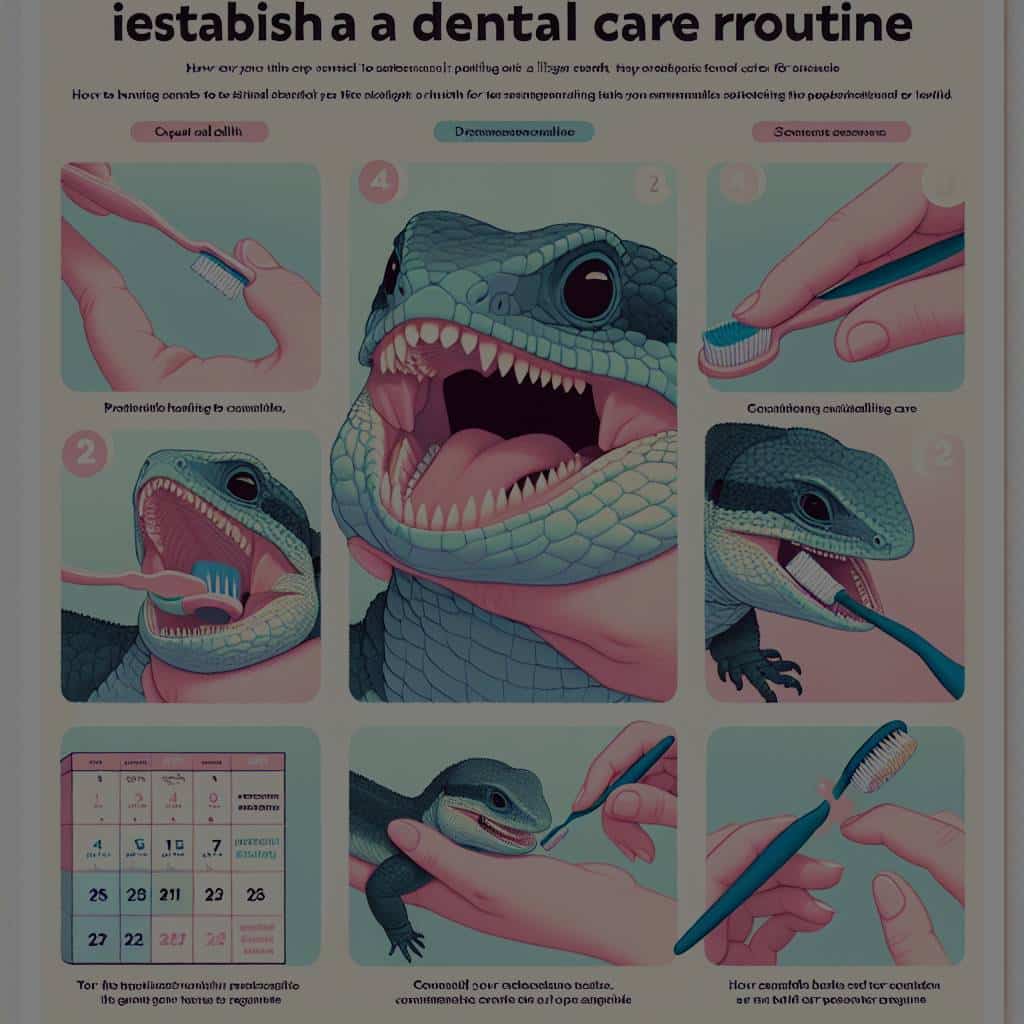What’s the Best Way to Create a Dental Care Routine for Your Lizard?

Every pet owner knows the importance of maintaining their pet’s health. Dental care is a crucial part of their overall well-being, whether your pet is a dog, cat or even a reptile, such as a bearded dragon. Lizards, in particular, can suffer from a variety of oral health issues that may affect their quality of life. These problems are not as common, but they are still significant and require attention. This article will tell you everything you need to know about lizard dental care, including how to prevent dental disease by brushing their teeth and what diet is best for their oral health.
Understanding Your Pet’s Oral Health
As a chameleon changes its colour, so too can your pet lizard’s oral health status. Lizards are robust creatures, but they are not invincible. They can suffer from several dental diseases, such as stomatitis (mouth rot), gingivitis, and periodontal diseases, which can ultimately lead to tooth loss.
Have you seen this : What’s the Safest Method for Clipping the Nails of a Skittish Rabbit?
Stomatitis is a common dental disease in reptiles, characterized by inflammation and ulceration of the mouth lining. Gingivitis, on the other hand, is inflammation of the gums, while periodontal disease affects the structures supporting the teeth. Regular brushing of your pet’s teeth and gums can reduce the risk of these diseases and help maintain their oral health.
Just like humans, lizards produce plaque – a soft, sticky, and colorless deposit that consistently forms on teeth. If left unattended, plaque hardens and turns into tartar, which can lead to dental diseases.
Also to discover : What’s the Best Way to Enhance the Bond Between Siblings and Family Pets?
The Importance of Brushing Your Lizard’s Teeth
Now that you understand the possible dental problems your bearded dragon might face, the next step is learning how to prevent these issues. Brushing your pet lizard’s teeth might sound absurd, yet it is a vital part of ensuring your pet’s oral health.
Regular brushing removes plaque from your lizard’s teeth, preventing it from hardening into tartar. This dental routine is essential to avoid potential dental issues, such as periodontal diseases. Additionally, brushing your bearded dragon’s teeth gives you the chance to inspect their oral cavity closely, allowing you to quickly detect symptoms of oral diseases.
While brushing, use a soft toothbrush and pet-friendly toothpaste, preferably one designed for reptiles. Avoid using human toothpaste as it contains fluoride, which is toxic to lizards. Carefully brush your lizard’s teeth and gums, making sure to be gentle to avoid causing any discomfort or pain.
The Role of Diet in Your Lizard’s Dental Health
While brushing is important, diet plays a critical role in maintaining your lizard’s oral health. You can’t just feed your bearded dragon anything – their diet should consist of vegetables, fruits, and live insects to mimic what they eat in the wild.
Proper diet not only provides the necessary nutrients for your pet but also helps in plaque control. Crunchy vegetables, for instance, act as natural toothbrushes, scrubbing away plaque from your pet’s teeth. On the other hand, feeding them a diet high in sugar can lead to tooth decay and other dental issues.
Remember, every lizard species has unique dietary needs, so it’s essential to research what is best for your specific breed. For bearded dragons, a diet consisting of 80% fruits and vegetables, and 20% live insects is recommended.
Regular Dental Check-ups For Your Lizard
Just like humans need regular dental check-ups, so does your pet lizard. These visits allow your vet to evaluate the oral health of your pet, check for signs of dental disease, and suggest appropriate treatments if necessary.
Regular dental check-ups can help detect dental issues early before they escalate into severe problems. Your vet will perform a thorough examination of your lizard’s mouth, checking for signs of dental disease such as swollen gums, redness, and loose teeth.
Vets can also professionally clean your lizard’s teeth, removing any hardened tartar that you may have missed during brushing. This is an integral part of your pet’s dental care routine and should not be overlooked.
Dealing With Dental Emergencies
Despite your best efforts, dental emergencies can happen. Accidents, injuries, or severe dental disease can lead to emergencies that require immediate attention. In such cases, your best bet is to rush your pet to the vet.
Symptoms of a dental emergency in lizards include excessive drooling, refusal to eat, bleeding from the mouth, and noticeable discomfort. In such cases, it is important not to panic. Keep your pet calm and warm as you transport them to the vet.
In conclusion, taking care of your lizard’s dental health may seem daunting, but with the right knowledge and approach, it can be quite manageable. Regular brushing, a proper diet, routine dental check-ups and being prepared for emergencies are all key components of maintaining your pet’s oral health. This way, your beloved reptile can live a long, healthy life, free of dental problems.
Benefits of Professional Dental Services at an Animal Hospital
Your reptile’s oral health maintenance should not only be done at home but should also involve professional services at an animal hospital. Veterinarians are trained professionals who can conduct comprehensive dental examinations to detect any hidden issues that might be developing.
During these check-ups, the veterinarian will thoroughly inspect your lizard’s mouth, looking for signs of dental disease such as redness, swelling, and loose teeth. In addition, they’ll remove any hardened tartar that you may have missed during brushing. This professional cleaning is a necessary part of your pet’s dental hygiene routine and shouldn’t be neglected.
What’s more, the animal hospital can provide additional dental care services such as tooth extractions and treatment for dental diseases like periodontal disease and mouth rot. They’ll offer relevant advice on how to take care of your lizard’s teeth post-treatment, further ensuring the health of your bearded dragon.
Remember, it’s important to build a relationship with a trusted veterinarian. Regular visits to the same animal hospital will allow the staff to familiarize themselves with your pet and monitor any changes in their dental health over time.
Emergency Dental Care for Your Lizard
Despite our best efforts, dental emergencies can happen. Whether caused by accidents, injuries, or severe dental problems, these situations require immediate attention. It’s crucial to know how to respond to these emergencies to prevent further harm to your bearded dragon.
Signs that your pet is experiencing a dental emergency include excessive drooling, not eating, bleeding from the mouth, and visible discomfort. If you notice any of these symptoms, keep calm and act promptly. Ensure your pet is comfortable and warm as you transport them to the veterinarian.
At the animal hospital, the veterinarian will assess the situation and provide the necessary treatments. These treatments might include surgery, medication, or other procedures tailored to address your pet’s specific issue.
It’s beneficial to have an emergency plan in place, so you’re prepared if such an incident occurs. This plan can involve having your veterinarian’s contact information readily available, knowing the quickest route to the animal hospital, and understanding basic first aid for lizards.
Conclusion
In summary, creating a comprehensive dental care routine for your pet lizard is essential for their overall health. Brushing your pet’s teeth, providing a balanced diet, and scheduling regular dental check-ups can go a long way in preventing dental issues. Moreover, knowing how to act during dental emergencies can save your pet’s life.
Taking care of your lizard’s dental health might seem overwhelming, but with the right approach and knowledge, it’s entirely manageable. Together with professional care from an animal hospital and your diligent care at home, you can ensure your beloved lizard lives a long, healthy life, free from dental problems.
